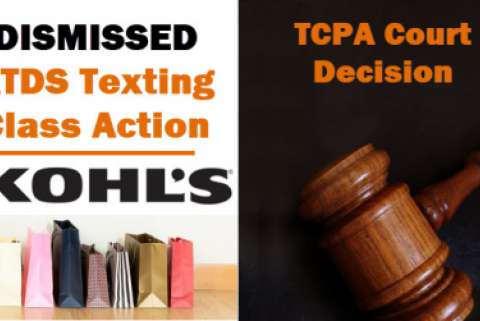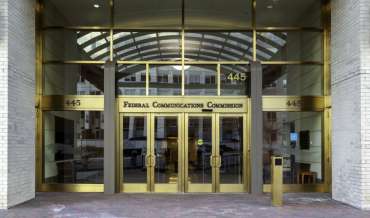The New Jersey district federal court dismissed a putative class action against Kohl’s Department Stores. In its decision, the court rejected the plaintiff’s claim that sentence long opt-out replies to automated text messages were a “reasonable” method for revoking consent under the TCPA. The plaintiff failed to follow Kohl’s explicit instructions which provided a clear and simple opt-out process for stopping their text messages.
On January 12, 2017, Amy Viggiano filed a complaint against Kohl’s Department Stores on behalf of herself and a class she believed to number in the tens of thousands. She claimed that Kohl’s used an Automatic Telephone Dialing System (ATDS) to text “sales alerts” to her cell phone after she had revoked her consent and therefore violated the Telephone Consumer Protection Act (TCPA). The class action sought $1,500 for every text message that had been sent during the applicable statute of limitations period.
The plaintiff alleged that by not honoring her request to stop sending automated text messages, Kohl’s:
- Negligently violated the TCPA
- Knowingly and/or willfully violated the TCPA
Did the Plaintiff Revoke Consent?
Ms. Viggiano admitted that she had initially consented to receiving text messages from Kohl’s, but later changed her mind. To revoke consent, she proceeded to send multiple text messages as replies to their sales alerts such as, “I don’t want these messages anymore.” The problem was that her responses failed to follow Kohl’s process for ending text messages which was to simply reply to the message with one word … “STOP”. Her ignoring of this process became the bases for Kohl’s defense.
Under the terms and conditions of Kohl’s mobile “sales alerts”, customers can opt-out of receiving future text messages by replying with the commands: STOP, CANCEL, QUIT, UNSUBSCRIBE, or END. Ms. Viggiano chose not follow the agreed upon instructions.
In response to each of her sentence long replies, Ms. Viggiano received an automated response that included: “Sorry we don’t understand the request! Reply HELP for help, STOP to cancel.” She did neither.
Kohl’s argued that it provided Ms. Viggiano and all other customers with an opt-out mechanism for text messaged “sales alerts” which was in compliance with Federal Communications Commission (FCC) requirements.
In response, Ms. Viggiano continued to argue that her sentence long responses were “unequivocal written withdrawals of consent.”
The Court Rules
The only issue the court needed to decide was whether Ms. Viggiano’s allegations “support a finding that she revoked consent in a reasonable manner.”
The FCC rules state that consumers may revoke consent “through any reasonable means.” In this situation the FCC rules are clear, “a caller may not designate a method of opting out in ways that make it difficult or impossible to effectuate revocation.”
In his ruling, Judge Brian Martinotti stated that Ms. Viggiano’s arguments “defy both the FCC ruling and common sense.” The court therefore found that as a matter of law that it is unreasonable for her to use “sentence-long messages” to revoke consent. In her agreement with Kohl’ she had been instructed to use “single-word commands” and was reminded to do so repeatedly by Kohl’s in their automated responses to her requests.
On November 27, 2017, a New Jersey federal judge dismissed the putative class action against Kohl’s. The court rejected Ms. Viggiano’s claim that her sentence long opt-out replies to automated text messages were reasonable and agreed with the defense that she failed to follow explicit instructions for stopping automated promotional text messages from the Kohl’s.
“To the contrary, the facts in the complaint suggest plaintiff herself adopted a method of opting out that made it difficult or impossible for defendant to honor her request.” – Judge Brian Martinotti
Judge Martinotti stressed that the Ms. Viggiano could not have reasonably expected that her requests for revocation of consent, in the manner that she did, would be honored given that each of her attempts generated an automated response stating that her message was not understood. It was the court’s opinion that there was no evidence proving Kohl’s knowingly and purposefully violated the TCPA.
Conclusion
Businesses continue to increasingly be targets of baseless TCPA lawsuits by professional plaintiffs and attorneys experienced in manipulating the TCPA to extract large settlements from businesses that follow all the rules, but make an inadvertent mistake. In this case the judge saw through the plaintiff’s attempted manipulations of the rules and rightly granted a favorable decision to Kohl’s.
This case is an example of a manufactured claim where the plaintiff ignored explicit instructions to reply with “STOP” to end further automated text messages. Similar cases have been filed where the plaintiff had texted “HALT” or “DISCONTINUE”. These are subtle tricks used by serial litigators who are either looking for quick settlements from businesses or a sympathetic judge. It is reassuring to see the courts wake up to the truth behind many of these TCPA lawsuits which are intent on generating profits for attorneys rather than solving real problems in the industry.





